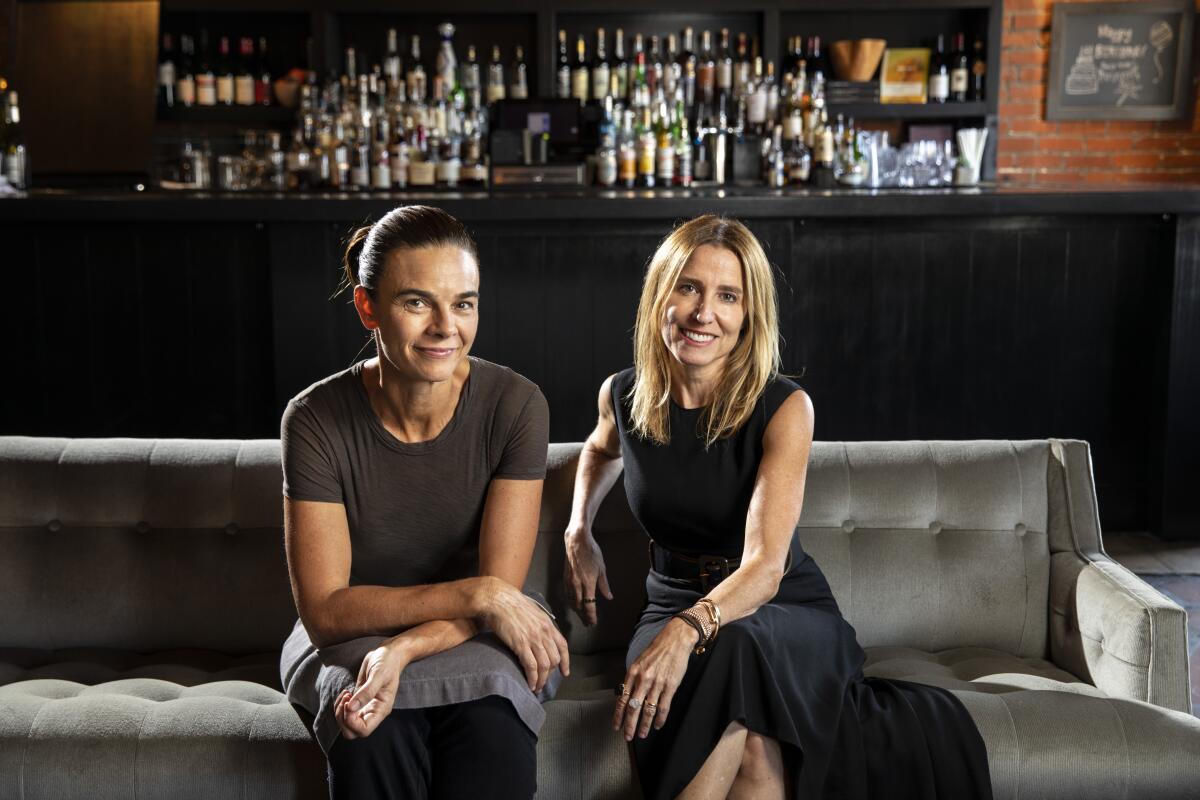Restaurants gearing up for another round of relief funds

- Share via
For independent restaurants and bars, federal aid could be on the way in a matter of weeks — and chefs and operators are already bracing for the application process.
On Wednesday, the U.S. House of Representatives passed the American Rescue Plan Act of 2021, a $1.9-trillion stimulus package that includes a $28.6-billion relief fund targeted to small, neighborhood restaurants, bars, food trucks and street vendors — especially those that struggled to obtain Paycheck Protection Program (PPP) loans or are still suffering losses beyond the loan amount. President Biden is expected to sign the federal stimulus bill Friday.
For the record:
9:59 a.m. March 11, 2021A previous version of this story said that Go Get Em Tiger had closed its ROW location in the Arts District. The closed location is on Third Street; the ROW location remains open.
Caroline Styne has immersed herself in the details of the rescue plan.
“We’re thrilled to get whatever we can at this point, and I think the money will go quickly because there’s just such a dire need out there,” she said.
In addition to cofounding the Lucques Group, which runs the restaurants A.O.C. and Tavern and a catering operation, Styne serves on the advisory board of the Independent Restaurant Coalition, an organization that has lobbied for federal aid for the service industry since March 2020.
The Lucques Group received multiple rounds of PPP loans, but Styne said it wasn’t nearly enough to sustain the business through the end of the pandemic. She said that she and her team will be applying for this new round of aid, which functions as a grant as opposed to a loan and has fewer restrictions on usage. Styne said she would use the funds to rehire staff and to pay back rent and other debts. If the Lucques Group is successful with the new round of grant applications, it could operate through the end of the year.
“That PPP loan only goes so far,” Styne said, describing it as a “band-aid.”
“It covers limited swaths of expenses, and the money is gone pretty quickly,” Styne continued. “The restaurant has a very long way to go in terms of recovery.”
The acceleration of the COVID vaccine rollout could lead to local restaurants and bars fully reopening later this month (with limited capacity). In order to do so, however, many owners and operators will need to pay months of back rent, utilities and product costs. For some restaurateurs, an entire year’s worth of bills has gone unpaid.
Once awarded, the restaurant and bar relief funds can be used for rent, mortgage payments, supplies, COVID-related construction, personal protective equipment, paid sick leave and payroll. Funds that are unused or misappropriated would have to be returned to the government by the end of the year. (The PPP loans are supposed to be used primarily for payroll.)
This new aid could be delivered “in a matter of weeks, not months,” according to Rep. Earl Blumenauer (D-Ore.), who introduced the $120-billion Restaurants Act to the House last June.
The new grant program is intended to help restaurants, bars and franchisees who operate 20 locations or less, and will be implemented through the Small Business Association. A provision within the bill is meant to ensure the SBA will prioritize women-, BIPOC- and veteran-owned operations, especially during an initial 21-day application period.
The owners of Genever, a gin-focused cocktail bar in Historic Filipinotown, received a $10,000 small-business loan through the city of Los Angeles in September (which was later converted to a grant), in addition to a $5,000 grant from a local business district the following month, and they plan to submit an application for the new federal aid as well.
“We’ll definitely apply for it,” said co-owner Roselma Samala. “Any assistance that can help us is appreciated.”
Genever closed a day after its second birthday last year, in mid-March, and reopened for cocktails to-go weeks later. PPP money, local grants and an additional emergency loan have helped the operation maintain a to-go presence but in order to reopen indoors, Samala said, the team will need this additional aid. (Samala said applying directly to the SBA, as opposed to banks, might expedite the process.)
“We typically wouldn’t have the time to research what banks we should apply to or how to apply or the technicalities of what the funding is for,” said Samala. “We just need to survive. We need to pay the bills, pay the mortgage.”
Samala said she would put grant money toward paying vendors, covering operational costs, rehiring staff, paying rent and setting up COVID-compliant indoor seating. The funds also would allow Genever to rehire its security guard, which, she believes, will help ensure that customers are compliant with COVID regulations.
On the other hand, some restaurateurs said they will sit out this round of aid.
“I kind of feel like it’s not really for us,” said Kyle Glanville, CEO and founder of local coffee chain Go Get Em Tiger.
Glanville said that while he did close one location (on Third Street in the Arts District) permanently during the pandemic, the string of coffee shops from Highland Park to Santa Monica has managed to stay afloat thanks to two rounds of PPP loans and the cafes’ takeout-friendly menu and retail coffee offerings — options that many full-service and fine-dining restaurants don’t have.
“We still have cafes where sales are down 80%. We’re still way, way down, and ultimately we’ve been operating at a loss for the last year, so it’s not that we couldn’t very much use the cash,” Glanville said. “I just feel it’s designed for a different customer. We’ve all read the horror stories of people exploiting the PPP benefits or the amount of outright fraud that occurred, or businesses that didn’t need it using it, and I’m just conscious that while we have a need, it’s not the most acute need.”
One year into the pandemic and that need, Glanville said, is fierce, and the competition for a cut of that $28.6 billion will be fiercer.
Glanville said the process to obtain his company’s first PPP loan was challenging. It took days, he said, despite a banker’s assurance that Glanville was one of the first bank customers to submit an application, and eventually he switched banks to secure that first loan.
The owner-operator regards the process with a degree of skepticism. He’s especially concerned about what he called “the logjam of applications,” and that restaurants and bars in marginalized and underfunded communities might continue to get buried in the rush.
“I think the big disappointment with how stimulus and aid has been rolled out is that at every turn, no matter how effective or important the program has been, we’ve kind of left marginalized communities to fend for themselves,” Glanville said. “I suppose if I have one hope for this round of restaurant aid, it would be that [it’s] not just the restaurants in Brooklyn or West Hollywood that do big tickets and fine dining. I hope that money finds its way to operators of color and people that serve marginalized communities. If history has taught us anything it’s that it usually doesn’t work that way.”
More to Read
Eat your way across L.A.
Get our weekly Tasting Notes newsletter for reviews, news and more.
You may occasionally receive promotional content from the Los Angeles Times.










